Searching the Help
To search for information in the Help, type a word or phrase in the Search box. When you enter a group of words, OR is inferred. You can use Boolean operators to refine your search.
Results returned are case insensitive. However, results ranking takes case into account and assigns higher scores to case matches. Therefore, a search for "cats" followed by a search for "Cats" would return the same number of Help topics, but the order in which the topics are listed would be different.
| Search for | Example | Results |
|---|---|---|
| A single word | cat
|
Topics that contain the word "cat". You will also find its grammatical variations, such as "cats". |
|
A phrase. You can specify that the search results contain a specific phrase. |
"cat food" (quotation marks) |
Topics that contain the literal phrase "cat food" and all its grammatical variations. Without the quotation marks, the query is equivalent to specifying an OR operator, which finds topics with one of the individual words instead of the phrase. |
| Search for | Operator | Example |
|---|---|---|
|
Two or more words in the same topic |
|
|
| Either word in a topic |
|
|
| Topics that do not contain a specific word or phrase |
|
|
| Topics that contain one string and do not contain another | ^ (caret) |
cat ^ mouse
|
| A combination of search types | ( ) parentheses |
|
Azure_Demo and Azure CAPs
The purpose of the Azure_Demo and Azure Content Acceleration Packs (CAPs) is to provide a set of items (Scorecards, Contexts, KPIs, Metrics, and more) that automatically gathers information from across your enterprise to build key performance indicators (KPIs) related to Microsoft Azure-related issues with OOTB data from Data Warehouse as well as Dashboard pages that display the relevant information. The CAPs provide broad and deep insight that should enable you to Improve Staff Effectiveness, Improve Responsiveness, Achieve Process Excellence, Improve Quality of Delivery, and Improve Customer Satisfaction. This CAP provides a 360 degree Azure view.
The Azure_Demo is based on data in .csv files that are part of the CAP package and Azure CAPs include data from the Azure data source.
Note To view data in the Azure-related reports, make sure you have installed BOE.
The relevant content pack is Azure. For details, see Integration with Azure.
 User Story
User Story
Nowadays, more and more IT organizations have decided to move their traditional IT infrastructure to the public cloud environment. Microsoft Azure is one of the top public cloud vendor in the market.
Chris is the Cloud Service Manager of the IT organization at ABC Inc. He needs to have a clear picture on the spending of the IT organization on the Microsoft Azure cloud service.
Chris uses ITBA, a business intelligence solution that leverages analytical functions to help him monitor all Microsoft Azure cloud service such as Compute(VMs), Storage, Database, Load Balancer, etc.…
-
During his daily work, he logs into ITBA and opens the Azure Billing page in the Dashboard to have an overall view of the IT organization cloud spending.
In the Azure Billing Dashboard page, the KPI List View component show the latest month Azure cost, the previous month Azure cost, as well as the year-to-date Azure cost.
In addition, in the Historical View component, he can see the trend of his Azure cloud cost, and in the Forecast View component the upcoming 3 months Azure cost forecasting.
Below that, the three Cluster Bar Chart View components show the Azure cost broken down by subscription, service, region, and Meter category. Using this information, Chris can analyze the Azure cost in the different layers to have more insight on the Azure cloud spending.
-
Then Chris opens the Azure Instance Dashboard page for Azure instance usage and cost analysis.
In the Azure Instance Dashboard page, the KPI List View component show the number of used Azure instances, the total Azure instance usage (hours), and the total Azure instance cost.
In addition, the Historical View component shows the trends of the organization Azure instance usage and cost. In the Forecast View component, Chris can see the upcoming 3 months Azure instance usage and cost forecasting.
Below that, in the three Cluster Bar Chart View components, Chris can view the total Azure instance cost broken down by instance type, the number of used Azure instances broken down by instance type, and the total Azure instance usage (hours) broken down by instance type.
-
For Azure cloud detail usage and cost information, Chris opens the Azure Showback reports and links to the Azure Showback Details reports which list all the detailed costs at each instance level.
 Azure_Demo and Azure
Azure_Demo and Azure
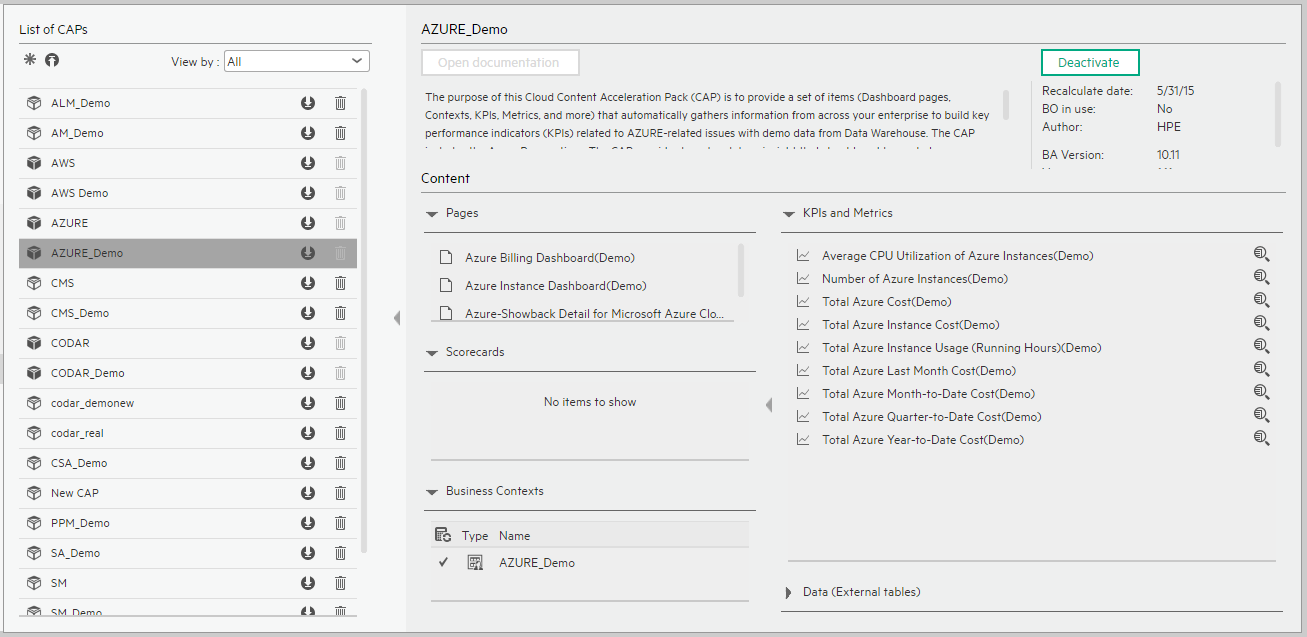
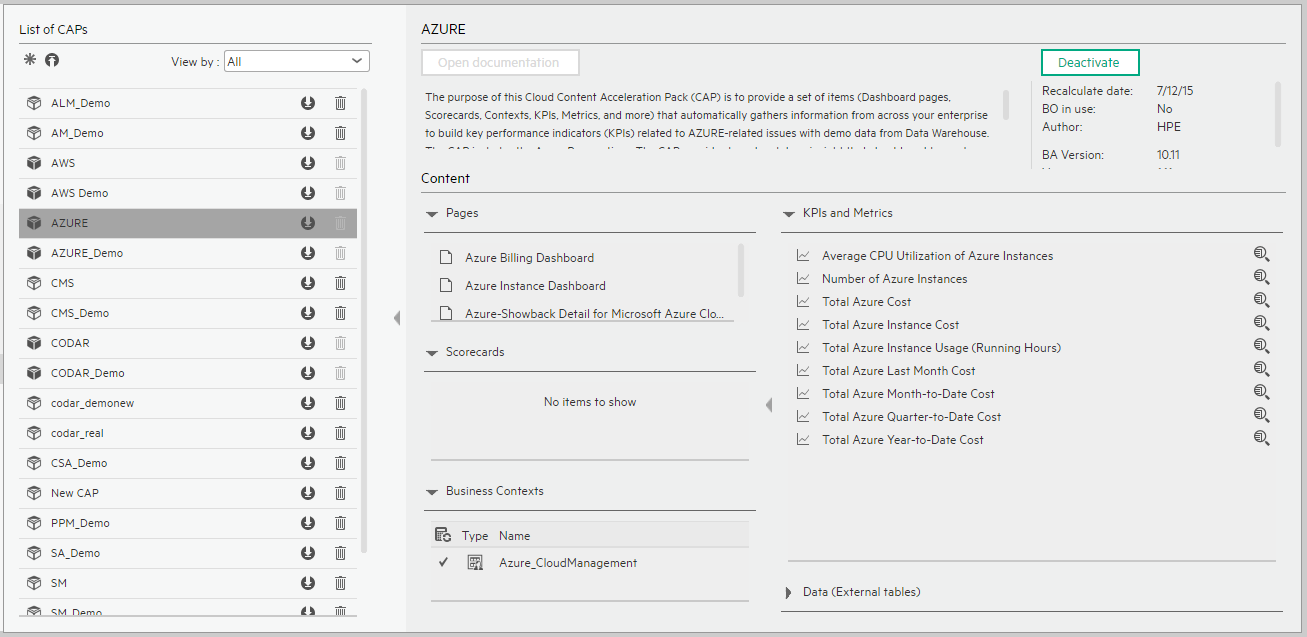
User interface elements are described below (when relevant, unlabeled elements are shown in angle brackets):
|
UI Element |
Description |
|---|---|
| Pages |
Azure - Showback for Microsoft Azure Cloud Service Page Azure - Showback Detail for Microsoft Azure Cloud Service Page Azure Billing Dashboard (Demo) Page Azure Instance Dashboard (Demo) Page Azure - Showback Detail for Microsoft Azure Cloud Service (Demo) Page Azure - Showback for Microsoft Azure Cloud Service (Demo) Page |
| Scorecards |
N/A |
| Business Contexts |
Azure_CloudManagement For details, see Semantic Layer - Contexts and Universes. |
| KPIs and Metrics |
Note The Demo CAP includes KPIs with names followed by (Demo). The CAP includes the same KPIs with names that do not include (Demo). The KPIs are the same but have different names so that both the Demo CAP and the CAP can be activated at the same time. Average CPU Utilization of Azure Instances Metric. The average of percentages of CPU utilization of Azure at the instance level. Number of Azure Instances Metric. The total number of instances consumed on Azure during the measurement period. Total Azure Cost Metric. The total cost of services provided by Azure during the measurement period. Total Azure Instance Cost Metric. The total cost of services provided by Azure Instances during the measurement period. Total Azure Instance Usage (Running Hours) Metric. The total number of hours consumed on Microsoft Azure during the measurement period. Total Azure Last Month Cost Metric. The total cost of services provided by Azure during the previous month. Total Azure Month-to-Date Cost Metric. The total cost of services provided by Azure for the period starting at the beginning of the current month and ending at the current date. Total Azure Quarter-to-Date Cost Metric. The total cost of services provided by Azure for the period starting at the beginning of the current quarter and ending at the current date. Total Azure Year-to-Date Cost Metric. The total cost of services provided by Azure for the period starting at the beginning of the current year and ending at the current date. |
| Data (External Tables) |
AZURE_demo |
 Azure Billing Dashboard Page
Azure Billing Dashboard Page
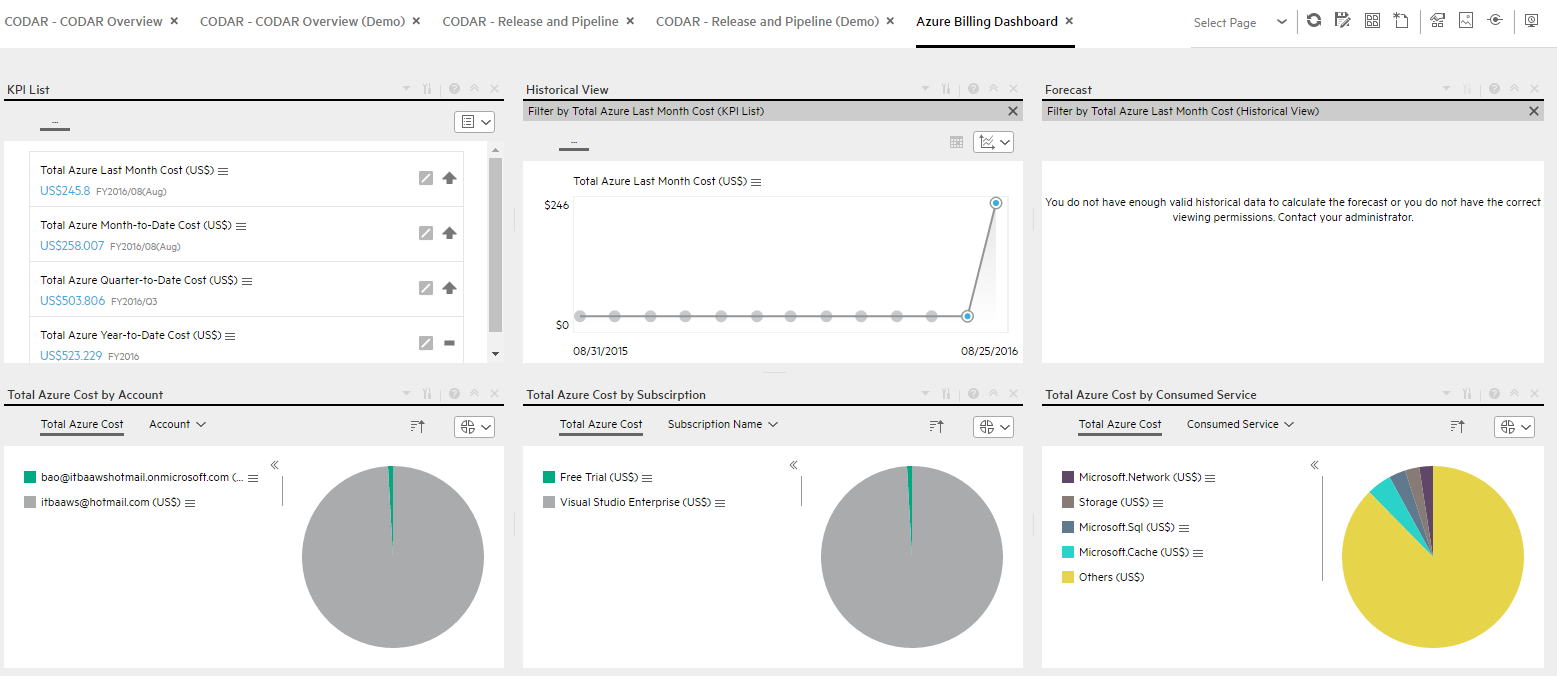
 Azure Instance Dashboard Page
Azure Instance Dashboard Page
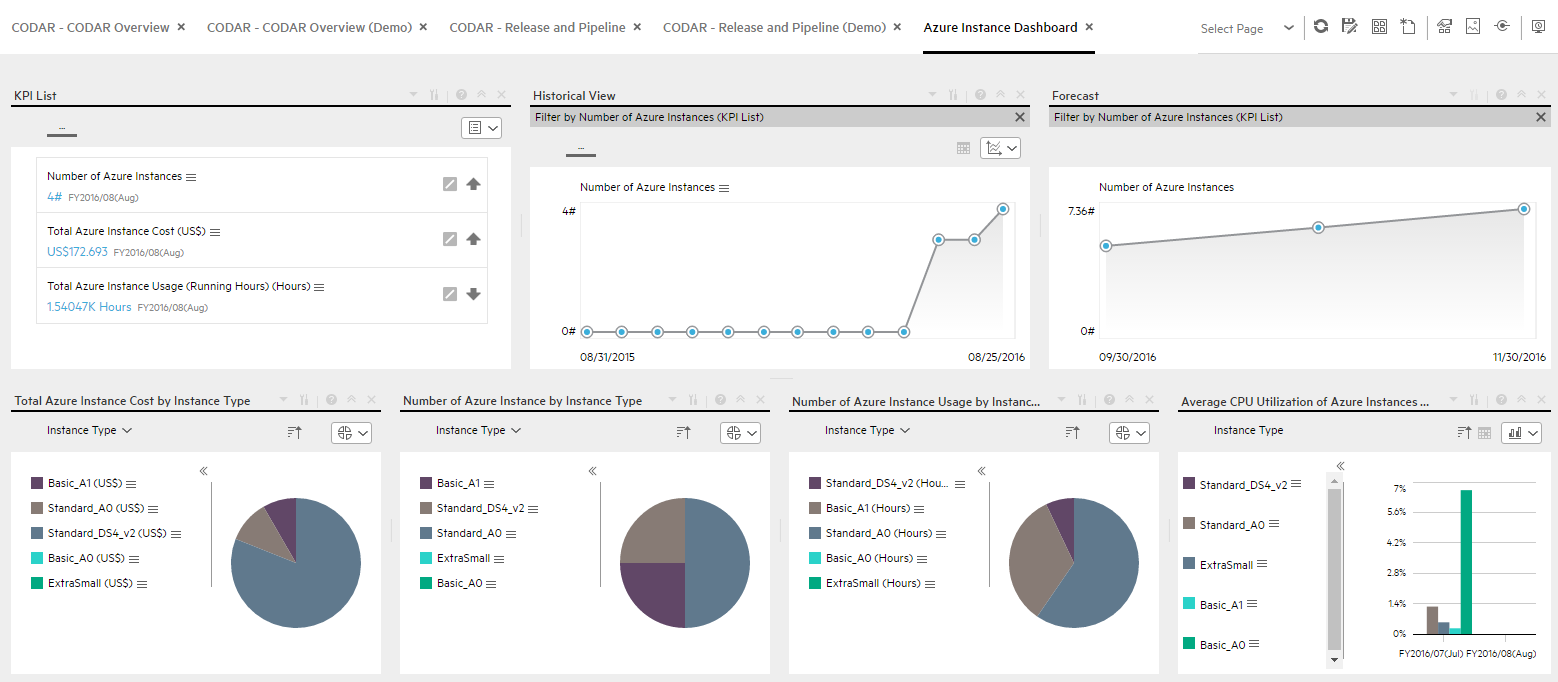
 Azure - Showback for Microsoft Azure Cloud Service Page
Azure - Showback for Microsoft Azure Cloud Service Page

 Azure - Showback Detail for Microsoft Azure Cloud Service Page
Azure - Showback Detail for Microsoft Azure Cloud Service Page

 Azure Billing Dashboard (Demo) Page
Azure Billing Dashboard (Demo) Page

 Azure Instance Dashboard (Demo) Page
Azure Instance Dashboard (Demo) Page

 Azure - Showback Detail for Microsoft Azure Cloud Service (Demo) Page
Azure - Showback Detail for Microsoft Azure Cloud Service (Demo) Page
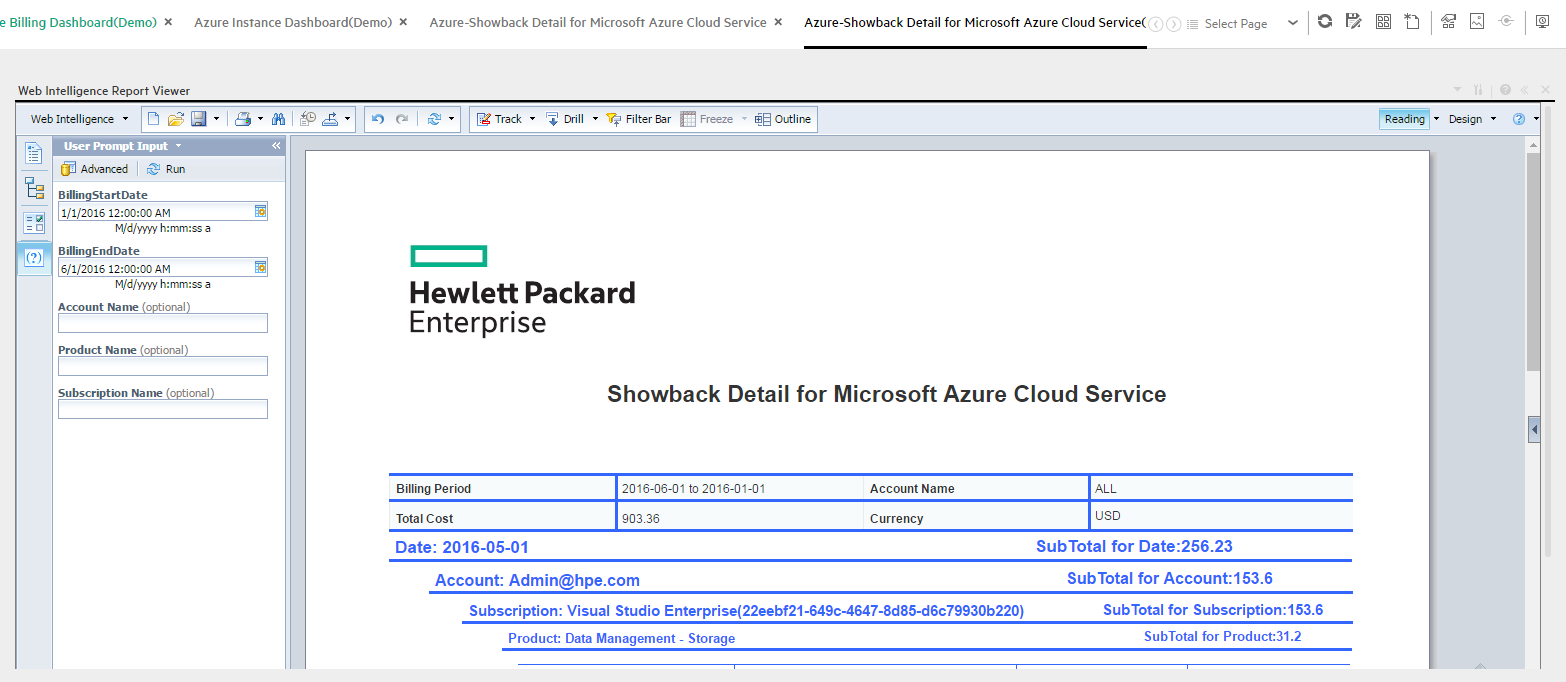
 Azure - Showback for Microsoft Azure Cloud Service (Demo) Page
Azure - Showback for Microsoft Azure Cloud Service (Demo) Page
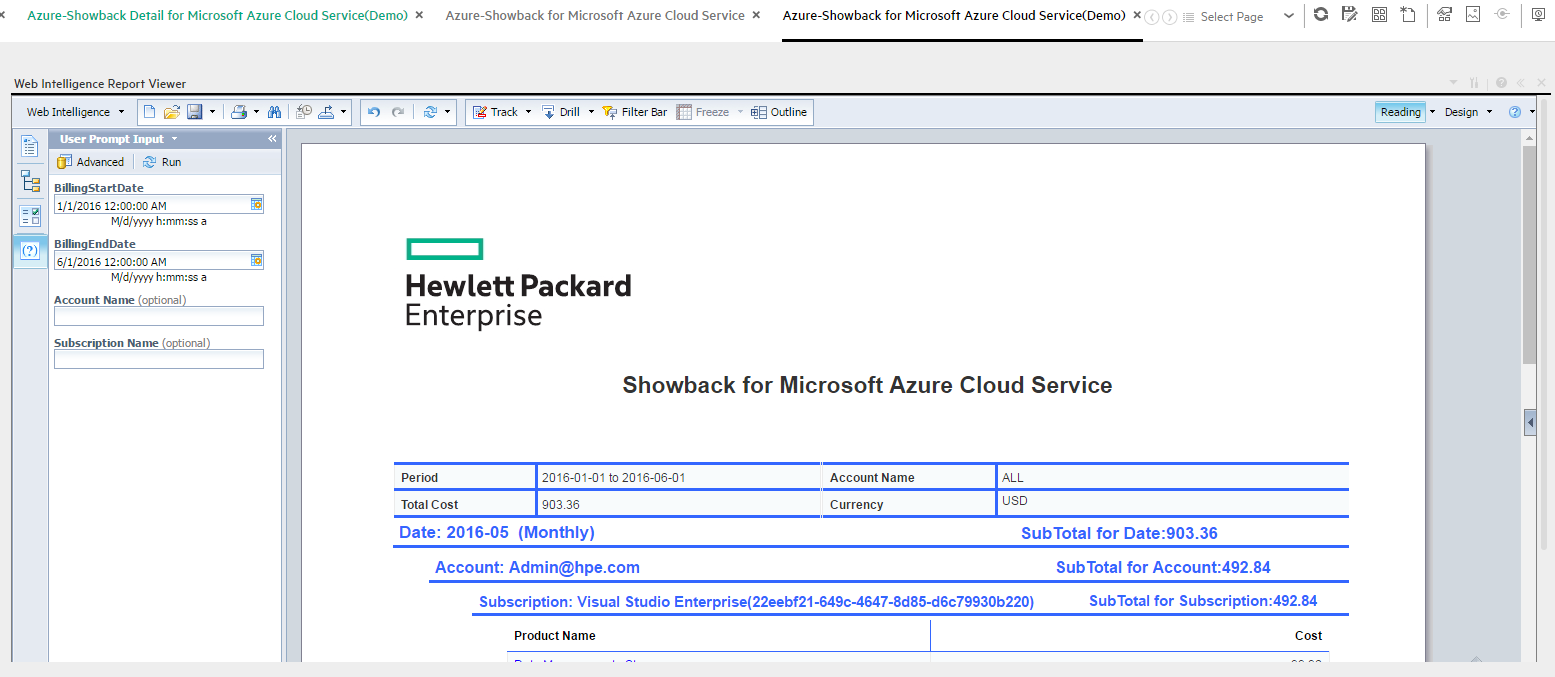
We welcome your comments!
To open the configured email client on this computer, open an email window.
Otherwise, copy the information below to a web mail client, and send this email to SW-Doc@hpe.com.
Help Topic ID:
Product:
Topic Title:
Feedback:





